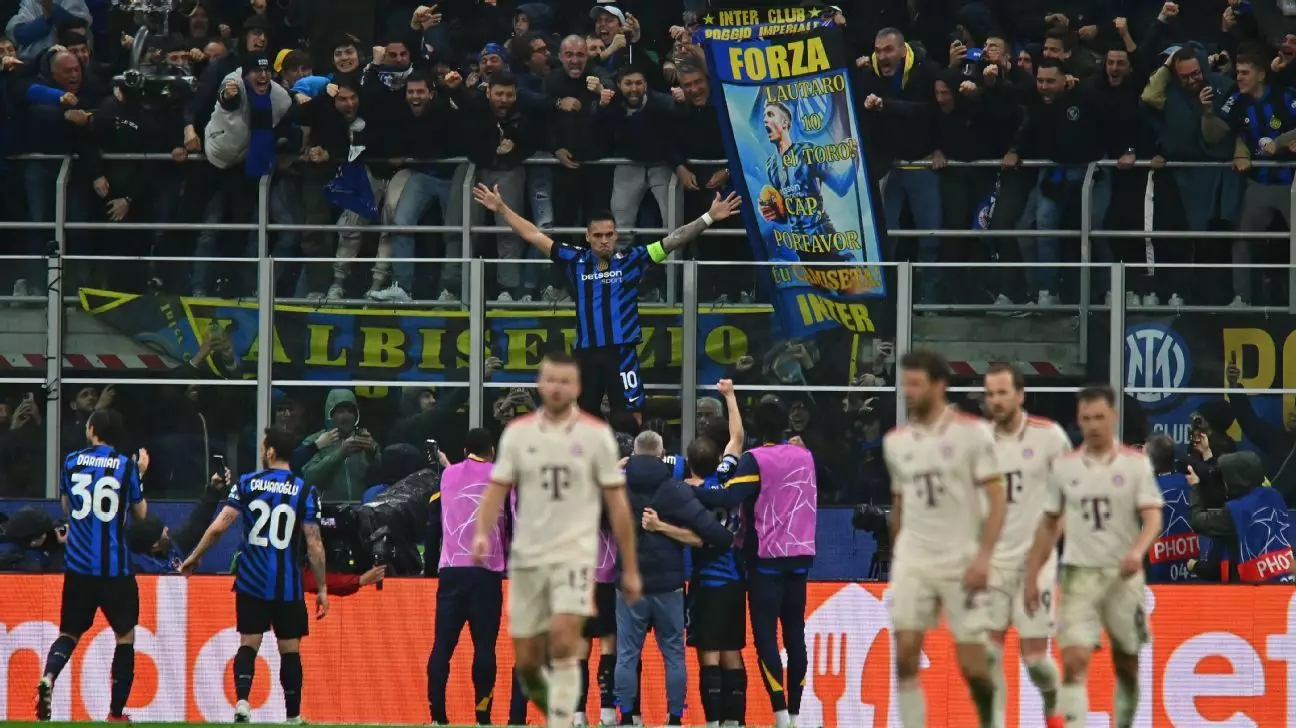Internazionale’s recent performance against Bayern Munich, resulting in a draw that secured their place in the UEFA Champions League semifinals, elicits mixed emotions. While it is commendable that they maintained their composure to advance on an aggregate score of 4-3, the manner in which they achieved this outcome raises significant questions about their tactical approach. Were they resilient, or simply resigned to defending their position? A team with the reputation and talent of Inter should not have been forced into a desperate retreat against a Bayern side stripped of its key players. Despite advancing, many fans and analysts must wonder what this means for their confidence moving forward.
As the game progressed, particularly after the 2-1 lead established by Benjamin Pavard, Inter should have embraced offensive play. Instead, the squad, perhaps out of fear of conceding, reverted to a defensive posture that allowed Bayern to dominate. The statistics from that period—eight shots from Bayern compared to just two from Inter—scream out an inefficiency in their game plan.
The Balance of Attack and Defense
Football is a dynamic sport that often requires teams to seamlessly transition between offensive attacks and defensive solidity. Sadly, Inter demonstrated a hesitancy that saw them surrender control to Bayern, who, despite being undermanned, exerted pressure relentlessly. The statistics reveal how they yielded possession, allowing Bayern to dictate the pace and style of play.
Encouragingly, Inter had managed to suppress Bayern’s attacking threats largely throughout the match. But at a crucial moment, Eric Dier’s late equalizer exposed a defensive lapse—one that stemmed not from individual error, but from a systemic retreat. This leads to an important question: how does a confident side morph into a timid team, fearing their opponent? Manager Simone Inzaghi must acknowledge this alarming shift if they intend to push through to the latter stages of the Champions League.
The Danger of Excessive Respect
In high-stakes matches against top-tier opponents like Bayern, it is essential to strike a balance between respect for their abilities and the confidence to play one’s game. Inter’s performance revealed an overabundance of respect that bordered on surrender. They relinquished their aggressive approach, allowing the Bayern side to press forward without the necessary pushback.
This situation became even more perplexing given the context of the game—a highly favorable position at home against a Bayer side in transition. Instead of seizing the momentum created by Pavard’s goal, Inter’s players retreated, with the team’s energy dwindling as they played deeper and deeper. The key to securing a solid defensive stance when facing an onslaught from any opponent is spirited resistance, not a complete capitulation.
Age and Energy: The Inter Dilemma
Another dynamic at play in Inter’s performance is the aging nature of both their active squad and their substituted players. Experienced players like Mehdi Taremi, returning from injury, are vital cogs on the pitch but may struggle to exert influence against younger, more agile opponents. Furthermore, Alessandro Bastoni’s apparent struggle with fitness highlights the demands placed on older players, further complicating their strategy to maintain intensity against a vigorous barrage of Bayern attacks.
While experience is invaluable, one cannot ignore the physical toll it takes, especially in high stamina matches. The team required more from its younger talents who could provide that spark and energy, particularly when outcomes hang in the balance. Inzaghi must navigate this challenge carefully as he prepares for the next round.
Future Prospects: Embracing the Challenge
While Inter’s stinginess on defense has earned them acclaim—having conceded only six goals throughout this Champions League campaign—the question is whether a more assertive playstyle would further bolster their success. As they prepare to face Barcelona in the semifinals, they must embrace an aggressive game plan that complements their defensive robustness.
The outcome against Bayern serves as a reminder that living on the edge through defensive plays can only take them so far. An assertive approach will not only challenge their opponents’ tactics but also build their self-belief and composure on the ball. Inter’s relentless pursuit of silverware demands not only defensive integrity but a willingness to assert themselves as formidable challengers in the face of adversity. Adopting this mentality could potentially allow Inter to shine through against future opponents—a quality that is arguably missing from their current approach.

